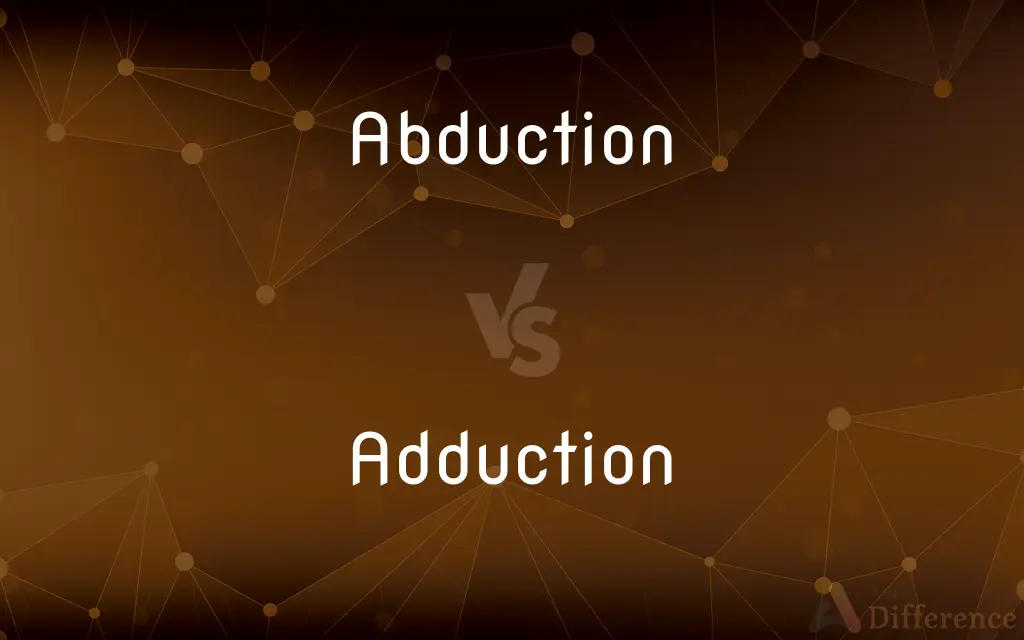Abduction vs. Adduction — What's the Difference?
By Tayyaba Rehman — Updated on October 25, 2023
"Abduction" refers to the act of forcibly taking someone away, while "Adduction" denotes the movement of a body part toward the midline.

Difference Between Abduction and Adduction
Table of Contents
ADVERTISEMENT
Key Differences
"Abduction" and "Adduction" might sound quite similar phonetically, but they have distinct meanings. "Abduction" often brings to mind criminal scenarios where an individual is taken against their will. It refers to the act of forcibly taking someone away or the process by which someone is taken. In contrast, "Adduction" is a term rooted in the domain of anatomy and physiology, indicating a specific type of movement.
When a limb or other body part is moved towards the center or midline of the body, it is undergoing "Adduction". It's the opposite of "Abduction" in the anatomical sense, which is the movement of a body part away from the body's midline. It's crucial to understand this distinction, especially in medical or sports-related contexts.
The very fact that "Abduction" is generally associated with criminal activities or anatomy, and "Adduction" is almost exclusively a term used in physiology, emphasizes the distinct realms in which these terms are relevant. While they might be confused due to their phonetic similarity, their usage in context makes their meanings clear.
In sum, "Abduction" paints scenarios of taking away, either in crime or anatomical movement, whereas "Adduction" specifically refers to a body part's movement toward the body's center.
Comparison Chart
Meaning
Act of forcibly taking someone away
Movement of a body part toward the midline of the body
ADVERTISEMENT
Usage
Common in criminal law and anatomy
Primarily in anatomy and physiology
Connotation
Negative when relating to crime
Neutral, technical
Associated Terms
Kidnap, seize
Movement, anatomy
Grammatical Function
Noun
Noun
Compare with Definitions
Abduction
The act of forcibly taking someone away against their will.
The police are investigating the abduction of a child from the playground.
Adduction
Movement of a body part toward the midline of the body.
After raising her arm, she brought it down in an adduction movement.
Abduction
Movement of a limb away from the midline of the body.
In yoga, lifting the arm sideways involves abduction.
Adduction
Anatomical action of pulling toward a central axis.
In the rehabilitation, he practiced adduction exercises.
Abduction
A logical inference starting from an observation.
Detectives used abduction to predict the criminal's next move.
Adduction
The drawing together of similar entities.
The trainer stressed the importance of adduction exercises.
Abduction
Drawing a conclusion from something known or assumed.
Through abduction, they inferred the cause of the event.
Adduction
Bringing together parts to a common axis.
The mechanism involves adduction to function properly.
Abduction
The process by which a new word or phrase is created.
Language evolution involves some level of abduction.
Adduction
A type of movement in bodily joints.
Adduction of the hip brings the leg closer to the body.
Abduction
To carry off by force; kidnap.
Adduction
To draw inward toward the median axis of the body or toward an adjacent part or limb.
Abduction
(Physiology) To draw away from the midline of the body or from an adjacent part or limb.
Adduction
A chemical compound that forms from the addition of two or more substances.
Abduction
Leading away; a carrying away.
Adduction
The act of adducing or bringing forward.
Abduction
(anatomy) The act of abducing or abducting; a drawing apart; the movement which separates a limb or other part from the axis, or middle line, of the body.
Adduction
(anatomy) The action by which the parts of the body are drawn towards its axis; -- opposed to abduction.
Abduction
(logic) A syllogism or form of argument in which the major premise is evident, but the minor is only probable.
Adduction
The act of adducing or bringing forward.
An adduction of facts gathered from various quarters.
Abduction
(legal) The wrongful, and usually forcible, carrying off of a human being.
The abduction of a child
Adduction
The action by which the parts of the body are drawn towards its axis]; - opposed to abduction.
Abduction
The act of abducing or abducting; a drawing apart; a carrying away.
Adduction
(physiology) moving of a body part toward the central axis of the body
Abduction
The movement which separates a limb or other part from the axis, or middle line, of the body.
Abduction
The wrongful, and usually the forcible, carrying off of a human being; as, the abduction of a child, the abduction of an heiress.
Abduction
A syllogism or form of argument in which the major is evident, but the minor is only probable.
Abduction
The criminal act of capturing and carrying away by force a family member; if a man's wife is abducted it is a crime against the family relationship and against the wife
Abduction
(physiology) moving of a body part away from the central axis of the body
Common Curiosities
In what professions is "Adduction" commonly used?
In fields like medicine, physiotherapy, and sports training.
Is "kidnapping" synonymous with "Abduction"?
Yes, "kidnapping" often means the same as "Abduction" in a criminal context.
Does "Adduction" always relate to a crime?
No, "Adduction" refers to a body part's movement toward the midline.
Is "Adduction" movement limited to limbs?
No, any body part moving toward the midline undergoes "Adduction".
Can machines or equipment help in "Adduction" exercises?
Yes, there are specific machines designed for "Adduction" exercises in gyms.
Can "Abduction" also refer to a movement in anatomy?
Yes, it means moving a limb away from the midline.
Are "Abduction" and "Adduction" antonyms in anatomy?
Yes, "Abduction" is moving away from the midline, while "Adduction" is moving toward it.
Are there exercises that focus on "Adduction"?
Yes, exercises that bring limbs toward the body's center emphasize "Adduction".
Can "Abduction" refer to deriving a theory from facts?
Yes, it can refer to a logical inference from observations.
Does "Abduction" only relate to humans?
No, while common with humans, any entity can be "abducted".
In a crime context, is "Abduction" always illegal?
Yes, forcibly taking someone against their will is illegal.
Share Your Discovery

Previous Comparison
Hiatus vs. Spell
Next Comparison
Elderly vs. ElderliesAuthor Spotlight
Written by
Tayyaba RehmanTayyaba Rehman is a distinguished writer, currently serving as a primary contributor to askdifference.com. As a researcher in semantics and etymology, Tayyaba's passion for the complexity of languages and their distinctions has found a perfect home on the platform. Tayyaba delves into the intricacies of language, distinguishing between commonly confused words and phrases, thereby providing clarity for readers worldwide.















































